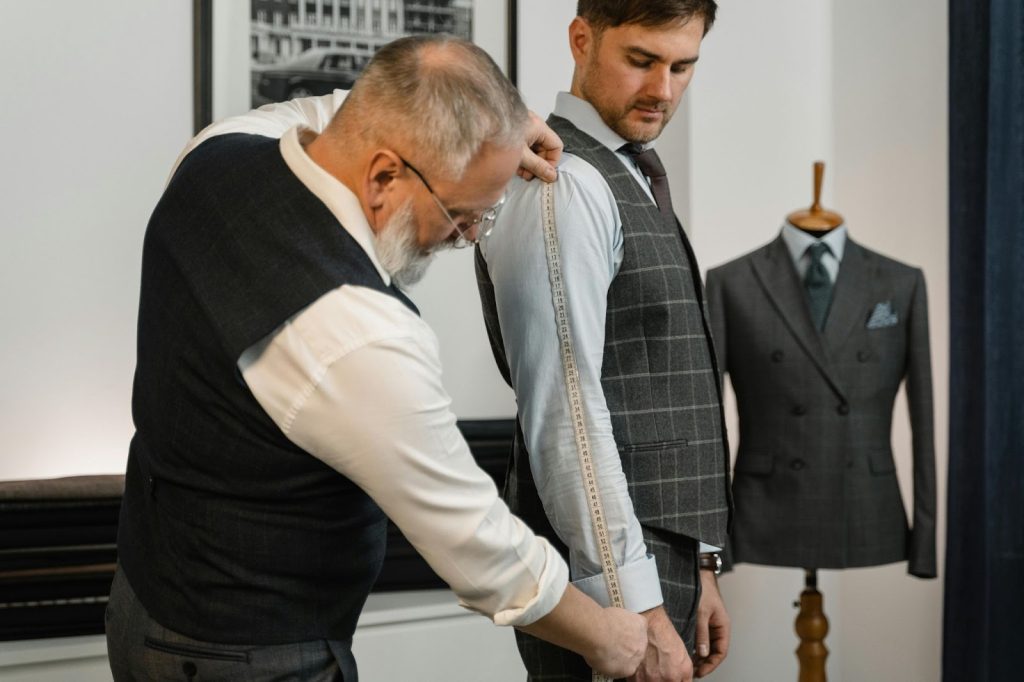
Bespoke tailoring is a time-honored tradition of creating custom-made clothing that is tailored specifically to an individual’s measurements, preferences, and style.
This artisanal approach to garment construction dates back centuries and has remained a symbol of luxury and craftsmanship.
The term “bespoke” originates from the 17th century, when cloth for a garment was said to “be spoken for” by a customer.
Bespoke tailoring distinguishes itself from ready-to-wear and made-to-measure clothing through its emphasis on customization and craftsmanship.
Unlike off-the-rack garments, which are mass-produced in standard sizes, bespoke garments are individually crafted to fit the unique measurements and proportions of each customer.
The origins of bespoke tailoring can be traced back to the bespoke tailors of London’s Savile Row, which became renowned for its skilled craftsmen in the 19th century. [1]
These tailors catered to the elite, including aristocrats, politicians, and celebrities, creating meticulously crafted suits that were a hallmark of sophistication and status.
Throughout history, bespoke tailoring has evolved alongside changes in fashion, technology, and social norms.
While it was once primarily associated with men’s formal wear, bespoke tailoring now encompasses a wide range of garments for both men and women, including suits, shirts, trousers, coats, and dresses.
Bespoke tailoring represents the pinnacle of sartorial excellence, offering discerning customers the opportunity to own clothing that is both impeccably tailored and uniquely expressive of their personal style and identity.
Here are key characteristics of bespoke tailoring you should know:
Bespoke tailoring involves a collaborative process between the customer and tailor, consisting of consultations, measurements, pattern-making, and fittings.
An initial consultation gathers the customer’s preferences and measurements, considering factors like body shape and fitting preferences.
Based on the measurements and design preferences, the tailor creates a unique pattern for the garment, accounting for fit and silhouette.
Multiple fittings allow for adjustments to the garment’s fit and silhouette, ensuring it drapes elegantly and complements the wearer’s body shape.
The selection of fabrics and materials is crucial in bespoke tailoring, influencing both the aesthetic appeal and performance of the garment.
Tailors offer a wide range of fabrics sourced from reputable mills, allowing customers to choose based on color, pattern, and texture to match their style.
Tailors educate customers on material quality, considering factors like thread count and finishing techniques to ensure durability and performance.
Tailors may offer specialized materials suited to specific occasions or climates, providing optimal comfort and versatility for various settings.
Bespoke tailoring represents a timeless tradition of personalized craftsmanship, offering discerning customers garments that are impeccably tailored to their individual measurements and style preferences.
Through a collaborative process involving meticulous measurements, pattern-making, and fabric selection, bespoke tailors create garments of unparalleled quality, fit, and elegance, ensuring a truly unique and luxurious sartorial experience.
Resources:
https://www.deoost.com/blog/what-is-bespoke-tailoring
https://pearcebespoke.com/blogs/blog/suit-construction-masterclass
https://www.gq-magazine.co.uk/gallery/savile-row-tailors-london